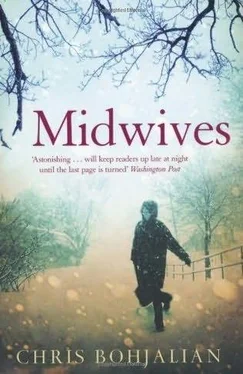Chris Bohjalian - Midwives
Здесь есть возможность читать онлайн «Chris Bohjalian - Midwives» весь текст электронной книги совершенно бесплатно (целиком полную версию без сокращений). В некоторых случаях можно слушать аудио, скачать через торрент в формате fb2 и присутствует краткое содержание. Жанр: Современная проза, на английском языке. Описание произведения, (предисловие) а так же отзывы посетителей доступны на портале библиотеки ЛибКат.
- Название:Midwives
- Автор:
- Жанр:
- Год:неизвестен
- ISBN:нет данных
- Рейтинг книги:5 / 5. Голосов: 1
-
Избранное:Добавить в избранное
- Отзывы:
-
Ваша оценка:
- 100
- 1
- 2
- 3
- 4
- 5
Midwives: краткое содержание, описание и аннотация
Предлагаем к чтению аннотацию, описание, краткое содержание или предисловие (зависит от того, что написал сам автор книги «Midwives»). Если вы не нашли необходимую информацию о книге — напишите в комментариях, мы постараемся отыскать её.
Midwives — читать онлайн бесплатно полную книгу (весь текст) целиком
Ниже представлен текст книги, разбитый по страницам. Система сохранения места последней прочитанной страницы, позволяет с удобством читать онлайн бесплатно книгу «Midwives», без необходимости каждый раз заново искать на чём Вы остановились. Поставьте закладку, и сможете в любой момент перейти на страницу, на которой закончили чтение.
Интервал:
Закладка:
At twelve (and fast approaching thirteen), I would ride or run or walk miles out of my way to watch Tom Corts-two years older than I and therefore in the ninth grade-smoke cigarettes. I probably would have gone miles out of my way to watch Tom Corts stack wood or paint clapboards. He wore turtlenecks all the time, usually black or navy blue, and they always made him look a little dangerous. But his hair was a very light blond and his eyes a shade of green that was almost girlish, and that made the aura of delicious delinquency that surrounded him almost poetic. Tom was the first of many sensitive smokers with whom I would fall deeply in love, and while I have never taken up that habit myself, I know well the taste of smoke on my tongue.
Tom Corts smoked Marlboros from the crushproof box, and he held his cigarettes like tough-guy criminals in movies: with his thumb and forefinger. (A few years later when I, too, was in high school, one of Tom's younger disciples, a boy in my grade, would teach me to hold a joint in that fashion.) He didn't inhale much, probably no more than necessary to light the cigarette and then keep it burning; most of the time, the cigarettes just slowly disappeared between his fingers, leaving ashes on the dirt or mud of the ball field, the sidewalk, or the street.
Tom had a reputation for driving adults wild, although rarely in ways they thought they should-or could-discipline. I remember the first hunting season when he was given a gun and taken into the deep woods with the older males in his clan, he shot one of the largest bucks brought down that year in the county. The men's pride in their young kin must have shriveled, however, when they saw how Tom mugged for the camera in the picture the owner of the general store took of the boy and the buck for his annual wall of fame. Tom wrapped one arm around the dead deer's neck and pretended to sob, and with his other hand held aloft a sign on which he'd named the deer, "Innocence."
It was also widely believed in town that Tom was the ringleader behind the group that somehow acquired cans of the sizzling yellow paint the road crews used to line highways, and one Halloween coated the front wall of the new town clerk's office with the stuff. The building, a squat little eyesore that not even the selectmen could stand, was a mistake the whole town regretted, and neither the constable nor the state police worked very hard to find the vandals.
On any given day, Tom was as likely to be seen somewhere reading a paperback book of Greek mythology-unassigned in school-as a magazine on snowmobiling; he was the sort of wild card who would skip a class trip to the planetarium in St. Johnsbury, but then write an essay on black holes that would astonish the teacher.
Initially, my father disliked Tom, but not so much that he ever discouraged me from trying to get the boy's attention, or suggested that it might be a bad idea for Rollie and me to try and ingratiate ourselves into his circle. I think my father-the sort of orderly architect who would stack his change by size every single night of his adult life, so that on any given morning I could find atop his bureau small skyscrapers of quarters and nickels and dimes-thought Tom ran a little too wild. My father came from a family of achievers-a line of farmers who actually prospered in Vermont's rocky soil, followed by two generations of successful small-business men-and he thought Tom's bad pedigree might be a problem. Although he knew Tom was very smart, he still feared the boy might end up like most of the Cortses in Reddington: working by day at the messy automotive garage that looked like a rusted-out auto graveyard, while trying to buy Budweiser with food stamps at night. It probably wasn't a bad life if you kept your tetanus shots current, but it wasn't the life my father wanted for his only child.
My mother understood why I found Tom cute, but she, too, had her reservations. "There are probably worse mushrooms in this world than a boy like Tom Corts," she once warned, "but I still want you to be careful around him. Keep your head."
They had both underestimated Tom, as they'd see the next year. He was always there for me when I needed him most.
In the mud season of 1980, Rollie's horse, Witch Grass, was twenty years old, and while her best years were well behind her, she was a good horse for us. Patient. Undemanding. And slow to accelerate. This last character trait meant a lot to us (and, I have to assume, to our parents), because we had given up our formal lessons a year earlier, tired of being told to sit up straight, post, and canter.
Witch Grass could carry both Rollie and me for long stretches on her chestnut back, although we tried to minimize the amount of time we dropped one hundred and ninety pounds onto her aging spine. One of us would sometimes walk beside her.
It was probably during the third week in March that I first let Tom kiss me.
Make no mistake, this wasn't one of those passionate, "we kissed" sort of moments: I was decidedly passive during my first kiss, and although Tom initiated the buss (and I was indeed a willing participant), he broke it off fast, and we were too young-and the ground too muddy-for our small part of the earth to move.
Rollie and I planned, as we had the day before, to take turns riding Witch Grass up Gove Hill, the only spot in Reddington her mother could think of where the ground was not either asphalt or deep mud. When the horse had had a chance to stretch her legs, we would ride together across the street and past the general store to the ball field, stealing a glimpse of Tom Corts and his vaguely truant friends. We might then continue up to the Brennans' sugarhouse, since even in the center of town we could see its steam winding up from the trees like the trail of a small but hyperactive geyser.
So Rollie took off on Witch Grass first, and I climbed over the electric fencing into the field by the barn where the horse grazed when Rollie was in school, and began shoveling the big clumps of horse turds into what Rollie and I secretly referred to as the Shit Barrow. Witch Grass wasn't my horse, but I spent so much time riding her that I tried to help with her care and feeding-which meant mostly midafternoon shoveling.
I hadn't been at it long when I heard my mother's station wagon churning up the street toward me, with its motor's characteristically ineffectual-sounding sputter. The wagon was a giant blue woody from the late sixties, and while my parents had considered trading it in during the oil crisis in 1973-a discussion driven as much by guilt over the way the animal guzzled gasoline and oil as it was by the cost of pumping dead dinosaurs into its belly to keep it moving-my mother was unable to part with it. She had had the wagon almost as long as she had had me, it had gotten her safely to over five hundred births, and she couldn't bear to put this particular partner out to pasture.
The field was beside one of Reddington's busier roads, the street that wound its way to Route 15-the road west to Morrisville and east to St. Johnsbury. That meant that my mother could have been on her way to practically anywhere: the grocery, the bank, a laboring mother.
She slowed down when she saw me, came to a stop in the middle of her half of the road (she didn't dare pull off into the mud beside it), and rolled down her window. I crossed the street with the McKennas' shovel still in my hands and balanced both feet on the yellow lines in the middle of the pavement, pretending the stripes were twin tightropes.
"Wanda Purinton's baby's coming," she said, smiling serenely the way she did whenever one of her mothers' labors had commenced.
"Is she far along?" I asked.
"Don't know. The contractions sound close. We'll see."
"You won't be home for dinner, will you." I tried to hide my disappointment; I tried to present this realization as a simple fact that needed confirmation, but it didn't come out that way.
Читать дальшеИнтервал:
Закладка:
Похожие книги на «Midwives»
Представляем Вашему вниманию похожие книги на «Midwives» списком для выбора. Мы отобрали схожую по названию и смыслу литературу в надежде предоставить читателям больше вариантов отыскать новые, интересные, ещё непрочитанные произведения.
Обсуждение, отзывы о книге «Midwives» и просто собственные мнения читателей. Оставьте ваши комментарии, напишите, что Вы думаете о произведении, его смысле или главных героях. Укажите что конкретно понравилось, а что нет, и почему Вы так считаете.











